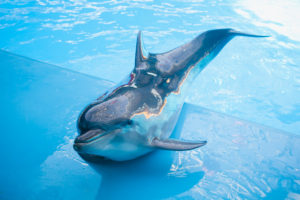Ric O’Barry: ‘Țările de Jos, închideți delfinariul!’
Ric O’Barry a solicitat Țărilor de Jos să închidă delfinariile. Fostul antrenor al lui Flipper și figură reprezentativă a protecției delfinilor la nivel mondial, acesta a dat declarația în timpul unei discuții la Camera Deputaților. O’Barry este de părare că a ține delfinii captivi este un act dăunător animalelor și dă dovadă de o formă incorectă de educație.

Miercuri, 8 iunie, la invitația deputaților Frank Wassenberg (Partidul pentru Animale) și Rudmer Heerema (VVD), protectorul delfinilor Ric O’Barry a avut o discuție despre delfinariu la Camera Deputaților. O’Barry, care după câțiva ani de lucrat cu delfinii, a decis să-și dedice viața eliberării și protejării acestor animale acvatice inteligente, a declarat că delfinariile reprezintă de fapt forme mascate de circ, dăunătoare animalelor, care transmit un mesaj greșit copiilor. Acestora li se comunică faptul că este acceptabil ca animalele să fie ținute în captivitate și să fie dominate.
O’Barry susține că atât în cazul omului, cât și al animalelor, luarea propriilor decizii este importantă. Aceasta converge cu viața delfinilor în captivitate, care se oglindește într-un bazin de beton. În acest bazin, delfinii nu își pot exercita comportamentul normal. O’Barry susține de asemenea că delfinii dintr-un delfinariu au o proastă comunicare între ei înșiși, deoarece sunetul sonarului lor se reflectă în bazinul de beton. O’Barry solicită Țărilor de Jos – „una dintre cele mai progresive țări din lume” – să devină un bun exemplu pentru restul lumii și să închidă delfinariul. Oricine din Țările de Jos poate contribui la aceasta prin a nu mai cumpăra bilete la spectacolele din delfinariu. Partidul pentru Animale sprijină din suflet solicitarea lui O’Barry.
Flipper
În anii ’60, Ric O’Barry însuși a prins cinci delfini din sălbăticie și i-a antrenat pentru popularul show de televiziune Flipper. Prin contactul pe care l-a avut cu aceste animale sociale și inteligente, O’Barry și-a schimbat perspectiva. Începând cu anii ’70, acesta și-a propus să comunice cât mai multor oameni în legătură cu efectele negative pe care le are captivitatea asupra delfinilor.
Ric O’Barry has called on the Dutch Parliament to close the Dolphinarium in the Netherlands. The global figurehead of dolphin protection and former trainer of the famous dolphin Flipper made his appeal during a meeting of the Dutch Lower House. O’Barry believes dolphin captivity to be animal-unfriendly and he feels that it sends the wrong message to our children.

At the invitation of MPs Frank Wassenberg (Party for the Animals) and Rudmer Heerema (VVD), dolphin protector Ric O’Barry has addressed the Dutch Lower House on the subject of the dolphinarium on Wednesday 8 June. O’Barry, who had worked with dolphins for a few years before deciding to dedicate his life to the freeing and protecting of intelligent marine animals, claims that dolphinariums are disguised circuses that are bad for animal welfare and send the wrong message to our children: they are taught that the captivity and domination of animals is acceptable.
O’Barry argues that the lives of both humans and animals are about making one’s own decisions. This is at odds with the lives of dolphins in captivity, which are spent entirely inside a concrete container. In this container, dolphins are unable to express normal patterns of behaviour. O’Barry also states that communication is very difficult for dolphins in a dolphinarium, as the sound of their sonar reverberates in the concrete container. That is why O’Barry has called on the Netherlands – “one of the most progressive countries in the world” – to set an example for the world by closing the Dolphinarium. Everyone in the Netherlands can contribute by not buying a ticket to a dolphin show. The Party for the Animals strongly supports O’Barry’s appeal.
Flipper
In the sixties, Ric O’Barry caught five dolphins from the wild, and trained them for his popular TV show Flipper. However, his contact with these social and intelligent animals made him change his mind, and since the seventies, O’Barry has dedicated himself to reaching as many people as possible about the adverse effects of dolphin captivity.